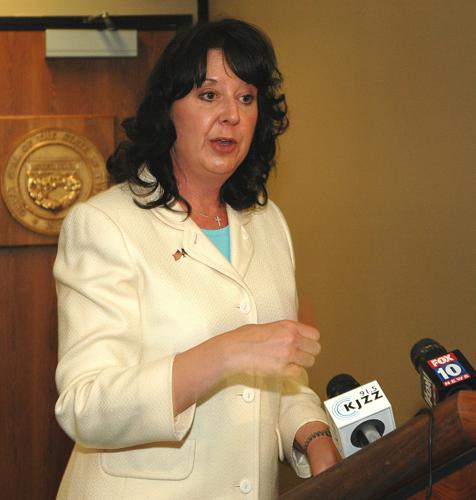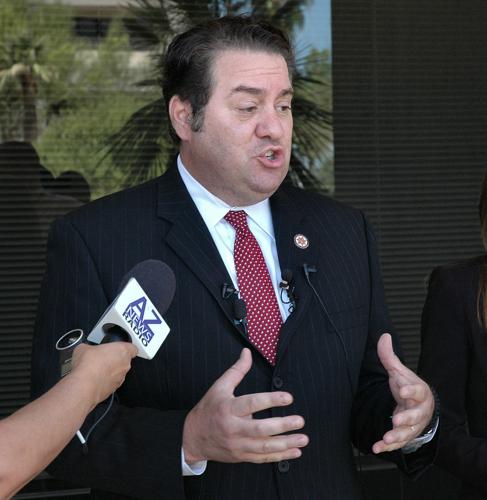PHOENIX — Attorney General Mark Brnovich hired a special investigator Thursday to determine if Secretary of State Michele Reagan broke any laws in the recent special election.
Michael Morrissey, a former federal prosecutor, will review the failure of Reagan’s office to ensure pamphlets describing the issues on the May 17 ballot were delivered to the homes of all registered voters before the early ballots went out. That should have happened by April 20.
Reagan does not dispute that at least 200,000 of the 1.9 million pamphlets were not mailed on time. And each of those was to go to a home with more than one registered voter, meaning at least 400,000 people may not have had the descriptions of the two measures before they mailed back their early ballots.
She said, though, the blame lies with others, including a contractor and a consultant.
But Ryan Anderson, spokesman for Brnovich, said the scope of the foul-up was actually larger than Reagan let on.
He pointed out that Reagan was responsible for preparing the mailing list for the brochures solely for the 13 rural counties, as Maricopa and Pima counties had prepared their own. Anderson said that left only about 533,000 brochures to mail; she got out about 328,000 on time.
“You don’t get to take credit for the list you didn’t prepare,” he said.
In his appointment of Morrissey, Brnovich wants to know exactly what went wrong and why. And the attorney general wants Morrissey to determine whether any criminal or civil laws were broken.
The attorney general also is interested in the delay between the time Reagan discovered her office had not complied with the law and actually disclosing that. He wants Morrissey to take a closer look in “any undue delay in remediating and publicly disclosing the failure to voters and county election officials.”
Brnovich has promised Morrissey complete independence, saying no one from his office will direct or control the inquiry. And he essentially empowered Morrissey with the same abilities as any other prosecutor in the office.
“It is understood that you may speak to anyone you deem appropriate to gather facts in relation to the inquiry,” Brnovich wrote to Morrissey.
Brnovich did not give Morrissey a deadline. But Anderson said his boss is hoping for some quick answers.
“We have an election that’s coming up in less than 90 days,” Anderson said.
“We recognize this is an investigation that’s going to take time, possibly for records and things like that to be produced,” he continued. “But we would like him to begin his investigation and come to an ultimate conclusion as soon as possible.”
Anderson said Brnovich hopes that what Morrissey turns up will be useful in preventing similar problems at the Aug. 30 primary “so we can learn from any potential mistakes that were made and make sure we don’t repeat them in the future.”
“We’ll welcome any inquiry or investigation,” said Reagan spokesman Matt Roberts. “And we look forward to visiting with Mr. Morrissey.”
Eric Spencer, Reagan’s elections director, prepared a 100-plus page report last month acknowledging the failure to meet the legal deadline for getting all the pamphlets into the homes of voters as well as the fact Reagan did not immediately inform voters and others. But Brnovich, in a separate letter Thursday to Reagan, said that answer was unsatisfactory.
“Overall, the response left some unanswered questions about how nearly 40 percent of the households for which the secretary of state produced the mailing list received their pamphlets weeks after the statutory deadline and why appropriate election officials and the public were not immediately notified of the issue,” Brnovich wrote.
The scope of the failure has taken on political overtones.
Proposition 123 to provide $3.5 billion in new funds to schools was approved by a margin of fewer than 20,000 votes out of more than a million cast. And proponents had more than $5 million to spend on the campaign, versus about $16,000 that state Treasurer Jeff DeWit, a leading foe, said was available to those trying to kill the measure.
Opponents have suggested the election might have turned out different had all the voters had the pamphlets and been able to read all the arguments for and against the measure.
Aside from launching the probe, Brnovich is urging Reagan not to wait until Morrissey completes his investigation to make changes.
First, he wants her to notify each county recorder, in writing, after completing any legally mandated election filing. That would require Reagan to effectively check and certify by the deadline that the law had been followed.
He also wants Reagan to review any complaint she gets from any county election official that residents were not receiving what should have been sent. And if it turns out that a “substantial number” of mailings in any county or statewide were not completed in time, Brnovich wants Reagan to “make a statewide announcement to inform voters and further notify the affected counties regarding the details of the failure.”
Roberts acknowledged that his office did not issue any sort of a statement on discovering the missed mailings. But he said that’s because it was more focused on fixing the problem and getting the pamphlets out to those who still needed them.
Morrissey’s bio says he has been practicing law for 29 years, including 22 with the U.S. Attorney’s Office in Arizona.
Now with the firm of Mitchell Stein Carey, Morrissey said he has represented individuals, licensed professionals and corporations in criminal matters.







